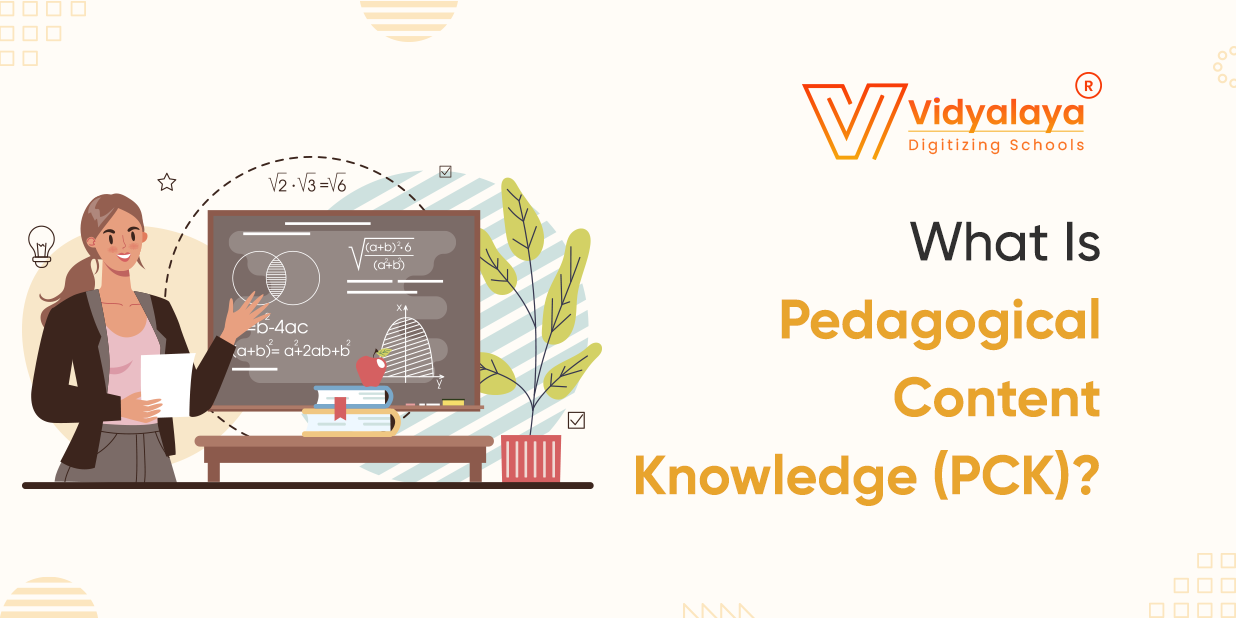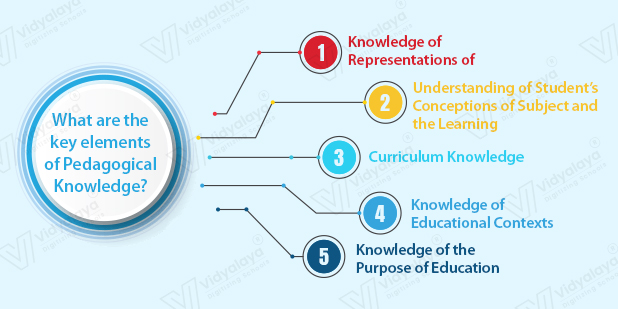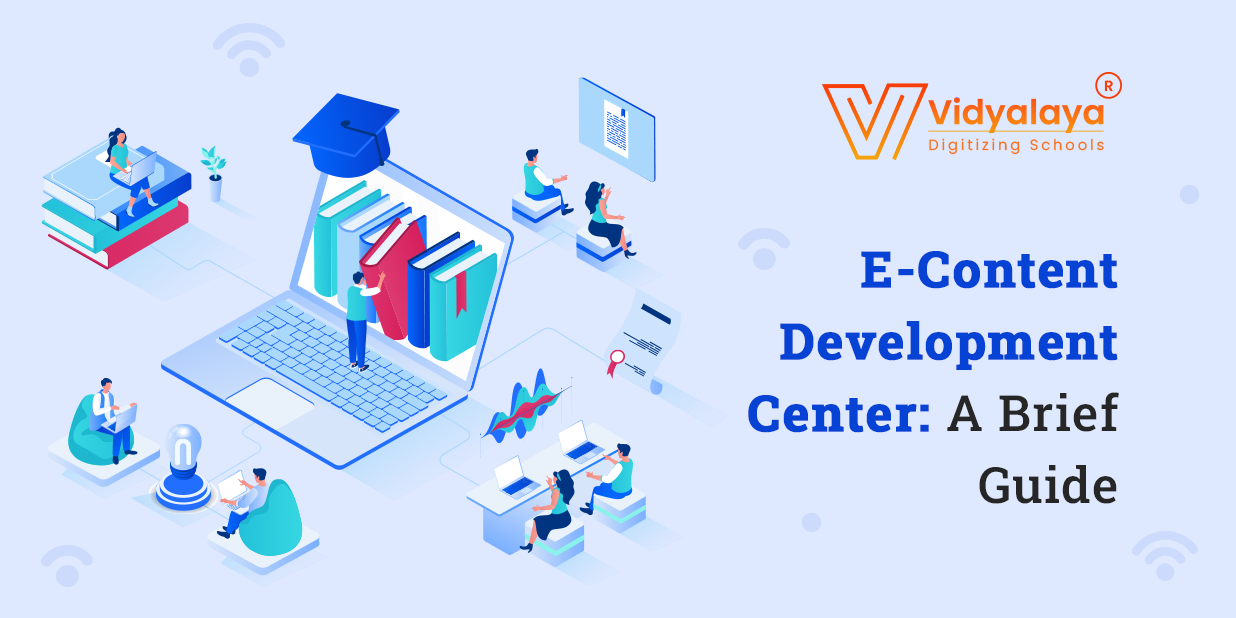In academics, teachers play a crucial role. Our Indian education culture has a great legacy of glorious teaching. Teachers used to be of utmost importance in shaping a student’s life and still, the place is irreplaceable. But teaching is not an easy task and entails several challenges and requires innovation, excellence, and dedication for this noble cause. This ongoing process of knowledge-building and skill development is essential in the context of content and student pedagogy. To understand this, one needs to learn the fundamentals of this profession. They also need to exhibit multitasking behaviour, unending learning passion, behaviour diagnostic and analysis skills. Learn what this new terminology means and what are the key elements of it in this education blog!
What is Pedagogical Content Knowledge?
Pedagogical Content Knowledge is the perfect combination of pedagogy and subject matter knowledge. It is the relationship between one’s understanding of content in a specific domain and the selection of teaching methodologies and strategies. This in-depth knowledge is important for selecting the right strategies so that they can support learners in their mastery of basic concepts and skills in the field.
Lee Shulman, in 1986, enlightened the education policy’s emphasis on pedagogy and unpacked several ways to make the pedagogy more meaningful in the teacher’s context expertise. According to him, content extends beyond the facts and includes structure and relationship between concepts in a proper discipline. Further, this pedagogical knowledge enables teachers to implement this deep understanding of context in their teaching practices.
What are the Key Elements of Pedagogical Knowledge?
Shulman insisted that the key to differentiating a teaching knowledge base is based on the intersection of content and pedagogy. To make this theory more effective, he proposed key elements of Pedagogical Content Knowledge which are as follows:
1. Knowledge of Representations of Subject Matter:
Teachers must aim to keep track of student’s understanding levels instead of just disseminating knowledge. They also need to know how specific content should be taught using different tricks and methods to make it easy for students. This is a crucial part of Pedagogical Content Knowledge. To achieve this, they must become innovative about various ideas to gather data from students about their understanding of specific concepts they can ask various questions in the lab and can check their levels of understanding. They can also make notes in person to record teaching methods or strategies. They can also try to implement the accumulated knowledge to relate it to real-world implications.
2. Understanding of Student’s Conceptions of Subject and the Learning:
It is obvious that many of the students understand the concepts and few still lack. Teachers must understand and what is lagging, what special strategies need to be developed to bring the lagging students in the stream. Teachers need to understand all these questions after concluding any topic or subject, rather than speeding to finish the topic. A subject matter is transformed for communication with students and includes what are the difficult areas of the content or topic. It also contains teaching strategies customized to address this specific teaching situation. They also need to clear the misconceptions about the topic and clear the uncertainty.
3. Curriculum Knowledge:
The curriculum of a course aims at effective student learning rather than providing guidance on specific content. It also reflects a wide national culture based on which the educational institute operates. It also differentiates your school from the neighborhood and defines the culture at the school level. Teachers’ connection with all grades and subject areas should be built as the aim behind a good curriculum. Teachers are advised to discuss with other teachers and ask for potential changes to get comprehensive curriculum knowledge.
4. Knowledge of Educational Contexts:
Teachers must be clear with educational contexts where they need to maintain the quality of learning and teaching. They should continuously strive to offer several learning outcomes and acquire the knowledge, skills, and deep understanding relevant to the curriculum. Teachers must be aware of the subject matter to bring today’s standards into the learning process. It will help students to map their own ideas, and redirect their learning to empower learning. Teachers need to see how they can work across subjects and can relate to daily life. Thus, they are called fundamental blocks of Pedagogical Knowledge.
5. Knowledge of the Purpose of Education:
According to Cochran et al. in 1993, elaborated Shulman’s Pedagogical Content Knowledge is based on various components. Teacher’s knowledge should be dynamic, comprehensive and continuously evaluation.
To illustrate this, here are the prime aspects of a teacher’s education:
- Understanding of environmental contexts
- Knowledge of pedagogy
- Knowledge of students and their understanding
- Subject matter knowledge
Teachers must understand what their profession aims for, the discipline, ethics, and methodologies of delivering value-based education.
How to use Pedagogical Content Knowledge?
Pedagogical Content Knowledge is used in K-12 classes using various steps to develop content that illustrates the specific content area.
Here are the steps to use the PCK:
- Identify the content-specific standard from the list of subject areas or grade level standard list.
- Use this content-specific standard as a foundation and develop a relevant learning target to identify what students should be able to do to illustrate the mastery of designated standards.
- Teachers need to consider the complexity levels of the content.
- They have to use these targets to design and develop learning activities and strategies for a lesson.
- These same learning targets help the development of appropriate informal and formal assessments.
Summing it Up!
The Pedagogical Content Knowledge is not a newbie. It is the teacher’s interpretations and transformations of subject-matter knowledge that can contribute to students’ learning affirmatively. Also known as craft knowledge, it comprises integrated knowledge along with teachers’ accumulated wisdom in accordance with their teaching practice. It links knowledge of teaching to knowledge about learning.




















